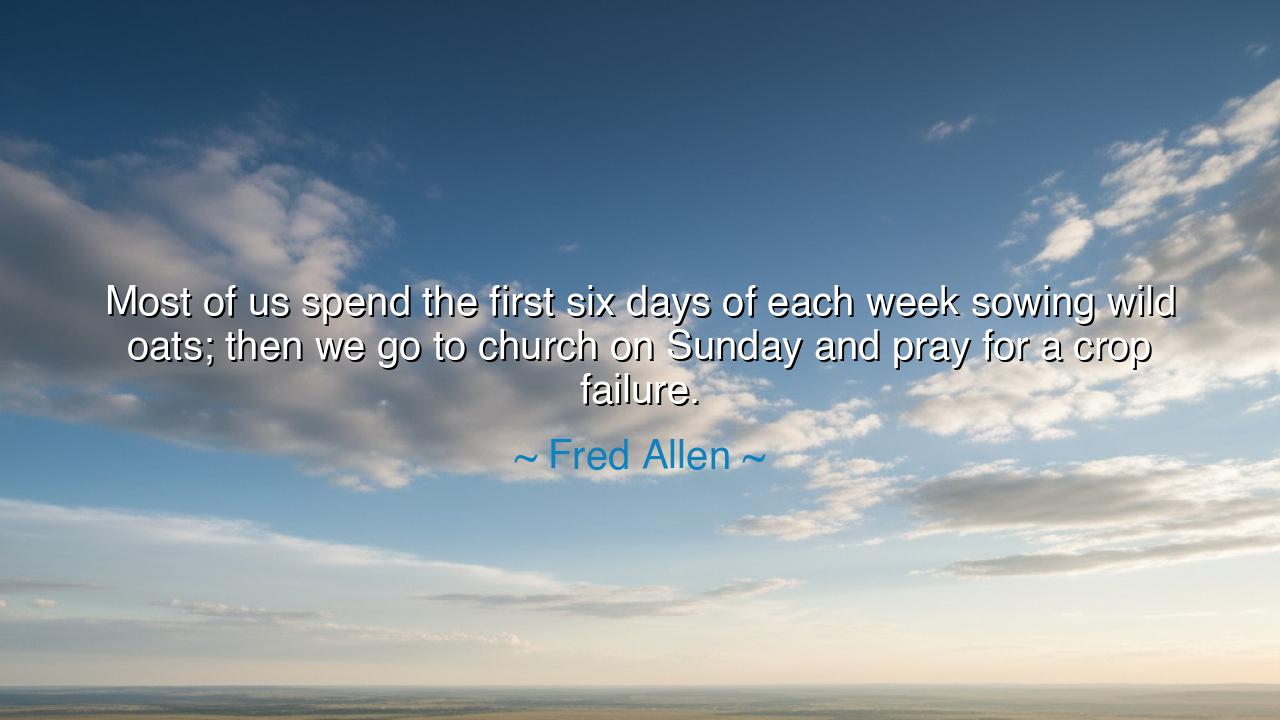
Most of us spend the first six days of each week sowing wild
Most of us spend the first six days of each week sowing wild oats; then we go to church on Sunday and pray for a crop failure.






Host: The room was quiet, bathed in the soft glow of the lamp as the evening outside unfolded into night. The gentle hum of the city barely reached them. Jeeny sat at the table, her fingers tracing the rim of her cup, her expression thoughtful. Jack, standing near the window, gazed out at the darkened world, his posture relaxed, but his mind clearly occupied. There was a comfortable stillness between them, as if a conversation was about to unfold, touching on something deeper.
Jeeny: (breaking the silence, her voice calm but curious) “I came across something by Fred Allen today that really made me smile. He said, ‘Most of us spend the first six days of each week sowing wild oats; then we go to church on Sunday and pray for a crop failure.’ What do you think about that?”
Jack: (pauses, a smile tugging at the corners of his mouth) “That’s a clever, yet really honest statement, isn’t it? It’s a playful way of acknowledging the contradiction between how we live during the week and how we wish to present ourselves on Sunday—whether it’s through religion or simply in how we want to be seen. There’s something about it that speaks to the tension between our actions and our desires for redemption or to avoid the consequences of those actions.”
Jeeny: (nodding slowly) “Exactly. It’s almost like he’s pointing out the hypocrisy or the irony in human behavior. We go through life making choices that don’t always align with our higher ideals, then on Sunday, we seek forgiveness, wishing we could undo what we’ve done. It’s almost like an acknowledgment that our human nature is prone to mistakes and contradictions, but we often look for an easy fix or a way out.”
Host: The stillness in the room deepened, the words lingering in the air. Jack turned slightly toward Jeeny, his expression thoughtful. Outside, the world had quieted, but inside, the conversation felt like it was unfolding into a reflection on human behavior, contradictions, and the tendency to seek redemption without fully confronting our own actions.
Jack: (his voice quieter now, more reflective) “It’s a reminder that we often live in this tension between what we know we should do and what we actually do. There’s a part of us that wants to make the right choices, but then there’s another part that’s drawn to the easy, the wild, the things that don’t require as much thought. And we often try to reconcile that tension with something like religion, hoping that we can just pray for it to go away.”
Jeeny: (softly) “Yes, it’s about the escape. We know we’re not perfect, but instead of addressing our flaws head-on, we try to fix them in a way that’s convenient, something that doesn’t require us to confront our own mistakes or growth. And that’s where the irony lies—praying for a crop failure doesn’t solve the problem; it just makes us feel like we’ve done something to escape the consequences.”
Jack: (nodding slowly) “And that’s the human experience, isn’t it? We’re constantly trying to balance the tension between our actions and our ideals. We want to live with integrity, but we’re also prone to those moments where we choose the path of least resistance. The key, I think, is not just seeking forgiveness or a quick fix, but taking responsibility and learning from those moments.”
Jeeny: (smiling gently) “Yes, it’s about understanding that growth comes from confronting our actions, from recognizing that we don’t always get things right. Instead of praying for a crop failure, maybe we need to look at what we’ve sown and figure out how to make the next harvest better.”
Host: The quiet between them felt deeper now, as their words settled into a shared understanding. The world outside had become still, but inside, there was a realization about the tension in human nature—the desire to reconcile our actions with our ideals and the ease of seeking forgiveness without fully confronting the need for change. Jeeny and Jack had uncovered a simple truth about growth: true redemption doesn’t come from avoiding consequences, but from learning, changing, and owning our choices.
Jack: (smiling softly, his voice more assured) “It’s a good reminder that we can’t always escape our mistakes, but we can choose how to handle them. Growth comes from taking responsibility and learning to make better choices.”
Jeeny: (nodding warmly) “Exactly. We may sow wild oats, but it’s how we tend the field afterward that really matters.”
Host: The night continued outside, but inside, the room was filled with understanding. Jeeny and Jack had found meaning in Fred Allen’s words—not just as a playful observation, but as a reminder of the tension between our actions and our ideals. True growth comes not from seeking quick fixes, but from facing our mistakes and choosing to learn from them, one step at a time.






AAdministratorAdministrator
Welcome, honored guests. Please leave a comment, we will respond soon